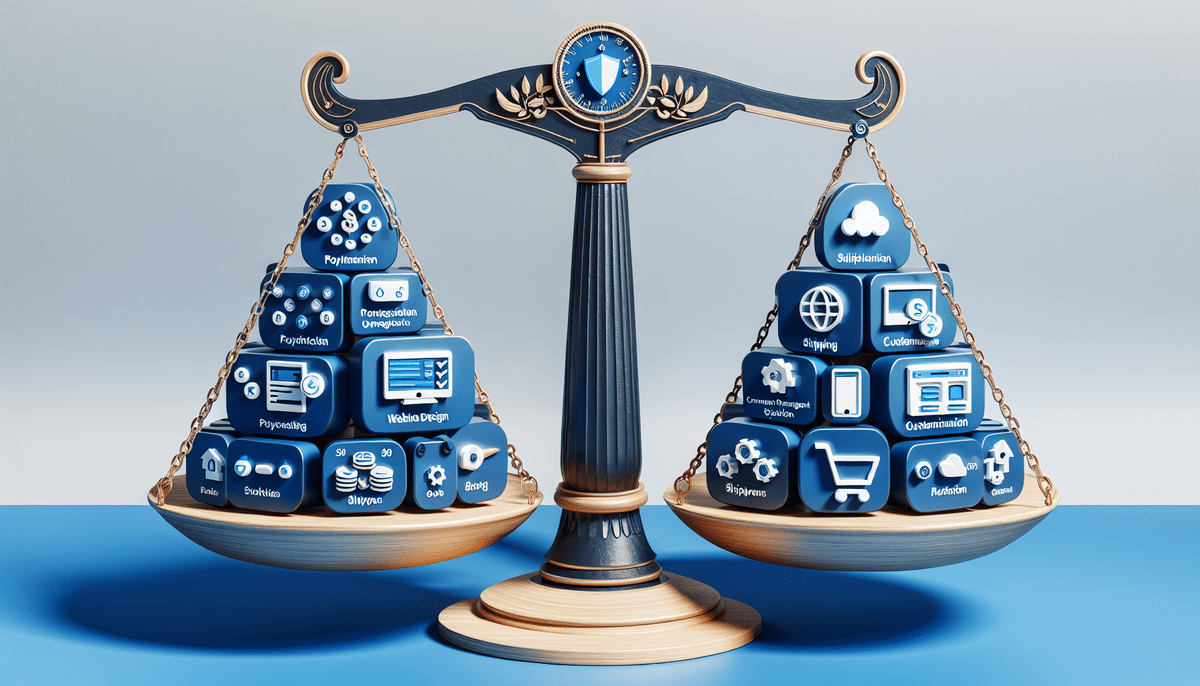Shopify vs BigCommerce: A Comprehensive Comparison
Choosing the right ecommerce platform is crucial for the success of your online business. Among the myriad of options available, Shopify and BigCommerce stand out as two of the most popular and robust solutions. This article provides an in-depth comparison of these platforms to help you determine which one aligns best with your business needs.
Overview of Shopify and BigCommerce
Shopify and BigCommerce are leading ecommerce platforms designed to help businesses establish and manage their online stores efficiently. Both platforms offer a range of features, including website design tools, payment processing, shipping integrations, and customer management. However, they cater to different business needs and preferences.
- User-Friendliness: Shopify is renowned for its intuitive interface and ease of use, making it an excellent choice for beginners.
- Customization: BigCommerce offers extensive customization options, ideal for businesses with more complex requirements.
Another significant difference lies in their pricing structures. Shopify provides a variety of pricing plans starting from $29 per month for the basic plan, scaling up to $299 per month for the advanced plan. In contrast, BigCommerce offers a more flexible pricing model based on your business size and specific feature needs, which can be advantageous for startups and growing businesses.
Pricing Comparison
Understanding the pricing models of Shopify and BigCommerce is essential for making an informed decision:
Shopify Pricing Plans
- Basic Shopify: $29/month – Suitable for small businesses and startups.
- Shopify: $105/month – Offers additional features for growing businesses.
- Advanced Shopify: $399/month – Designed for larger enterprises with advanced needs.
BigCommerce Pricing Plans
- Standard: $39/month – Ideal for new online stores.
- Plus: $105/month – Offers more advanced features for growing businesses.
- Pro: $399/month – Tailored for high-volume businesses requiring comprehensive features.
Additionally, BigCommerce does not charge any transaction fees on any of its plans, which can result in significant savings for businesses with high sales volumes. Shopify, on the other hand, imposes transaction fees ranging from 2.4% to 2.9% plus 30 cents per transaction, depending on the plan.
Ease of Use
The user experience is a critical factor, especially for those new to ecommerce platforms:
Shopify
- Interface: Features a drag-and-drop builder that is highly intuitive, allowing users to design and manage their stores with ease.
- Documentation & Support: Offers extensive documentation, a vast knowledge base, and 24/7 customer support via chat, email, and phone.
BigCommerce
- Interface: While more feature-rich, it can be more complex for beginners but offers greater control for advanced users.
- Documentation & Support: Provides comprehensive resources and personalized onboarding for new users.
Overall, Shopify tends to be more beginner-friendly, whereas BigCommerce caters to users seeking deeper customization and control.
Customization and Flexibility
Tailoring your online store to match your brand and business needs is essential:
Shopify
- Themes: Offers over 70 professionally designed themes that are customizable to fit various branding needs.
- Code Access: Allows access to CSS and HTML for further customization.
BigCommerce
- Themes: Provides a range of free and premium themes with extensive customization options.
- API Access: Features an open API, enabling more advanced and complex integrations and customizations.
BigCommerce is generally preferred by businesses that require more flexibility and have the technical expertise to leverage its advanced customization capabilities.
Features and Functionality
Both platforms offer a robust set of features, but they cater to different business needs:
Shopify
- Product Management: Ideal for businesses with a moderate number of products.
- App Store: Boasts over 4,000 apps, allowing extensive functionality enhancements.
- SEO Tools: Provides basic SEO functionalities with easy-to-use interfaces.
BigCommerce
- Product Management: Suited for businesses with large inventories and complex product structures.
- Built-In Features: Includes advanced features like multi-channel selling, built-in analytics, and comprehensive APIs.
- SEO Tools: Offers more advanced SEO capabilities, including customizable URLs, meta descriptions, and a robust content management system.
BigCommerce's built-in multi-channel selling allows businesses to seamlessly integrate with platforms like Amazon, eBay, and Facebook, expanding their reach without additional plugins.
SEO and Marketing Capabilities
Optimizing your online store for search engines is vital for visibility and traffic:
Shopify
- SEO Features: Includes basic SEO tools such as customizable title tags and meta descriptions.
- Apps: Offers a variety of SEO apps like SEO Manager to enhance optimization efforts.
BigCommerce
- SEO Features: Provides advanced SEO functionalities, including automatic sitemaps, customizable URLs, and server-side redirects.
- Content Marketing: Features a built-in blog and comprehensive content management system to support content marketing strategies.
While Shopify is user-friendly for basic SEO tasks, BigCommerce offers more in-depth SEO tools, making it a better option for businesses that prioritize search engine visibility.
Mobile Responsiveness
With the growing importance of mobile commerce, ensuring your store is optimized for mobile devices is essential:
Shopify
- Themes: Offers a wide range of mobile-responsive themes that ensure a seamless shopping experience across all devices.
- Mobile App: Provides a convenient mobile app for store management on-the-go.
BigCommerce
- Themes: Features mobile-responsive designs, though some may require additional customization for optimal performance.
- Mobile App: Includes a mobile app for managing your store, similar to Shopify.
Both platforms are equipped to handle mobile commerce effectively, but Shopify's extensive selection of mobile-optimized themes often gives it an edge for businesses focusing heavily on mobile sales.
Payment Processing and Security
Ensuring secure and flexible payment options is crucial for customer trust and satisfaction:
Shopify
- Payment Gateways: Supports over 100 payment gateways, including Stripe, PayPal, Apple Pay, and Google Pay.
- Security: Offers built-in SSL certificates, PCI compliance, and its own payment gateway, Shopify Payments, which includes fraud analysis tools.
BigCommerce
- Payment Gateways: Provides a wide array of payment options, including region-specific gateways like Klarna, SOFORT, SEPA Direct Debit in Europe, and Alipay, WeChat Pay, UnionPay in Asia.
- Security: Includes SSL certificates, PCI compliance, and offers additional security features like IP whitelisting and two-factor authentication.
BigCommerce excels in offering international payment methods, making it a strong contender for businesses aiming for a global market. Both platforms prioritize security, ensuring that customer data is protected.
Customer Support and Community
Reliable customer support can significantly impact your ability to resolve issues and optimize your store:
Shopify
- Support Channels: Provides 24/7 customer support via email, live chat, and phone.
- Resources: Hosts an extensive knowledge base, community forums, and numerous tutorials and webinars.
BigCommerce
- Support Channels: Offers support via live chat, email, and phone during business hours, with extended support options available on higher-tier plans.
- Resources: Features a comprehensive knowledge base, community forums, and personalized onboarding services for new users.
Shopify generally has more extensive and round-the-clock support options, which can be advantageous for businesses operating across different time zones or needing immediate assistance.
Integrations and Add-Ons
Seamlessly integrating your ecommerce platform with other tools can enhance functionality and streamline operations:
Shopify
- App Store: Offers over 4,000 apps, including popular integrations like Mailchimp and QuickBooks.
- Ease of Integration: Numerous third-party apps make it easy to extend store capabilities without extensive technical knowledge.
BigCommerce
- App Marketplace: Provides a selection of around 600 apps, focusing on integrations that leverage its open API for enhanced customization.
- Developer-Friendly: Excellent for businesses with in-house developers looking to build custom integrations.
Shopify's extensive app ecosystem offers greater flexibility for businesses looking to add diverse functionalities, while BigCommerce's integrations are ideal for those requiring more tailored solutions.
Pros and Cons
Understanding the strengths and weaknesses of each platform can guide your decision:
Shopify
- Pros:
- User-friendly interface
- 24/7 customer support
- Extensive app store
- Strong mobile optimization
- Cons:
- Higher transaction fees on lower-tier plans
- Less flexible pricing structure
- Limited built-in features compared to BigCommerce
BigCommerce
- Pros:
- No transaction fees
- Advanced SEO features
- Greater customization options
- Flexible pricing based on business needs
- Cons:
- Steeper learning curve for beginners
- Smaller app marketplace
- Can be more expensive for high-tier plans
Choose Shopify if you prioritize ease of use and robust support. Opt for BigCommerce if you require advanced customization and prefer a platform with no transaction fees.
Real-Life Examples of Businesses Using Shopify or BigCommerce
Numerous successful businesses leverage Shopify and BigCommerce to power their online operations:
- Shopify: Huel and Gymshark utilize Shopify to manage their high-traffic ecommerce stores efficiently.
- BigCommerce: Skullcandy and The Paper Store rely on BigCommerce to handle their extensive product catalogs and complex business needs.
These examples highlight the versatility and scalability of both platforms in accommodating diverse business models and sizes.
Final Verdict: Which Ecommerce Platform Is Better for Your Business?
Deciding between Shopify and BigCommerce hinges on your specific business requirements and priorities:
- Choose Shopify if:
- You seek a user-friendly platform with a straightforward setup process.
- Access to a vast array of apps and integrations is important.
- Reliable 24/7 customer support is a priority.
- Choose BigCommerce if:
- You require advanced customization and scalability.
- Avoiding transaction fees is crucial for your business model.
- Advanced SEO and built-in features are necessary for your marketing strategy.
We recommend taking advantage of the free trials offered by both platforms to experience their features firsthand. Assess how each platform aligns with your business goals, budget, and technical capabilities to make the best decision for your ecommerce venture.






















